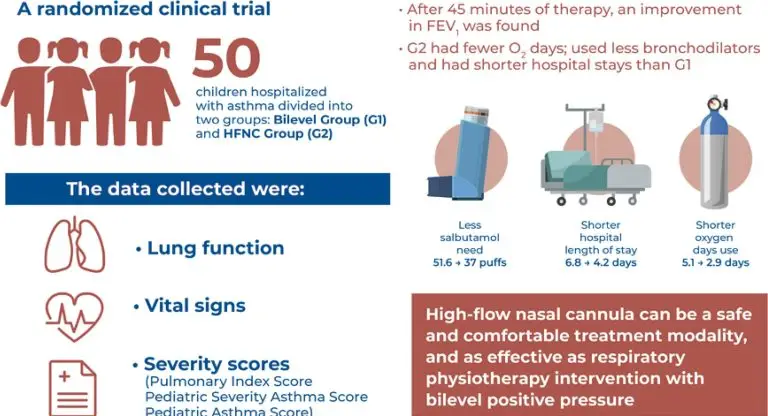Comparison of the effects of high-flow nasal cannula and bilevel positive airway pressure treatments as respiratory physiotherapy interventions for children with asthma exacerbation: a randomized clinical trial

12/Aug/2024
Comparison of the effects of high-flow nasal cannula and bilevel positive airway pressure treatments as respiratory physiotherapy interventions for children with asthma exacerbation: a randomized clinical trial
einstein (São Paulo). 12/Aug/2024;22:eAO0588.
View Article12/Aug/2024
Comparison of the effects of high-flow nasal cannula and bilevel positive airway pressure treatments as respiratory physiotherapy interventions for children with asthma exacerbation: a randomized clinical trial
DOI: 10.31744/einstein_journal/2024AO0588
Highlights Positive airway pressure may improve the severity of asthma exacerbation. A high-flow nasal cannula can improve respiratory physiotherapy outcomes. Positive airway pressure is indicated for moderate asthma exacerbation. Bilevel positive airway pressure and high-flow nasal cannula use may improve the pulmonary function. ABSTRACT Objective: To evaluate and compare the efficacy of high-flow nasal cannula treatment and that of bilevel positive airway pressure treatment as respiratory physiotherapy interventions for pediatric patients who are hospitalized because of asthma exacerbation. Methods: During […]
Keywords: Asthma; Bronchodilator agents; Cannula; Child; Child, hospitalized; Length of stay; Physical therapy modalities; Positive-pressure respiration
02/Jun/2021
High-flow nasal cannula failure: can clinical outcomes determine early interruption?
DOI: 10.31744/einstein_journal/2021AO5846
ABSTRACT Objective: To evaluate the evolution of clinical outcomes in children with bronchiolitis who used a high-flow nasal cannula, and to determine after long of non-clinical improvement the therapy should be discontinued, and treatment should be escalated to other forms of ventilatory support. Methods: An observational retrospective study of infants with bronchiolitis who used a high-flow nasal cannula. Patients were divided into two study groups according to success or failure of high-flow nasal cannula therapy, namely the Success Group and […]
Keywords: Bronchiolitis; Cannula; Child; Respiration; Risk Factors

